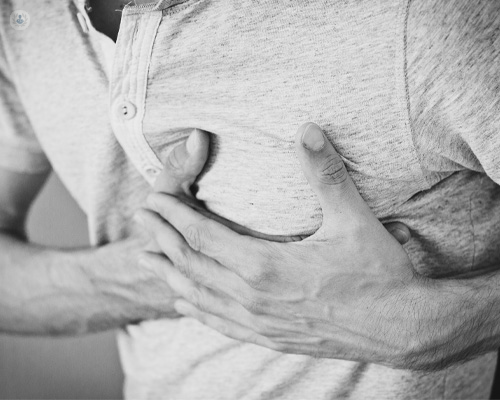Shortness of breath and the heart: the connection explained
Written by:We recently had the pleasure of speaking with expert consultant cardiologist, Dr Khalid Barakat, about the connection between one’s breath and heart, the most common causes of shortness of breath, and what symptoms may indicate heart problems.
Read on to find out if shortness of breath is always related to the heart or not. Don’t forget, if you feel in any way worried about the state of your heart, don’t hesitate to contact Dr Barakat today to consult further.

What is the connection between the breath and the heart? Is shortness of breath always related to the heart?
Shortness of breath or dyspnoea, to give it its medical name, is a symptom which patients report to a doctor rather than a sign which is something that a physician observes. Shortness of breath can be a manifestation of a problem in relation to the workings of the heart.
The heart is, in essence, two parallel pumps (left and right heart) that each consist of two chambers - the atria and ventricles. The atria, Latin for entrance hall, is the smaller of the two chambers and receives blood which they then pump into the ventricles.
The ventricles then pump the blood out of the heart. The left heart receives blood from the lungs where the blood has been enriched with oxygen and the waste product of CO2 has been released. It then pumps it out into the aorta, which is the huge blood vessel running through the middle of the body. This gives off numerous branches supplying blood to all the different organs in the body. Blood from all these organs is taken back to the right heart through veins and then the right heart pumps the blood into the lungs, before starting the cycle again.
The blood circulation is a one-way system, and to facilitate this, there are valves separating the ventricles from the atria so that when the ventricles pump blood out, the blood cannot go backwards into the atria. Similarly, there are valves at the exit of ventricles to stop the blood coming back into the ventricles.
Diseases of the heart can cause breathlessness if they interfere with the efficiency of the heart pump. A weakness of the heart muscle caused by a previous heart attack, excess alcohol intake, or viral infection of the heart muscle, can reduce the effectiveness of the left ventricle and cause an increase in the pressure in the blood vessels draining the blood from the lungs.
The latter results in stretching of those vessels which is sensed by nerve ending. This gives a sensation of breathlessness. A stiffening of the heart muscle with longstanding uncontrolled high blood pressure can have a similar effect.
If the valves in the heart begin to malfunction with either restriction in their opening or leaking, then this can also lead to a sensation of breathlessness through a similar mechanism. Arrhythmias, such as atrial fibrillation (disturbances of the rhythm of the heart) can cause inefficiency of the pumping efficiency of the heart and cause shortness of breath. Although heart disease primarily causes shortness of breath, diseases of the lung and its circulation also often present with shortness of breath.
What are the most common causes of shortness of breath?
This depends on the setting in which patients are seen. In the outpatient setting, asthma and chest infections are common causes, as well as obesity and smoking. Lung diseases such as chronic obstructive pulmonary disease and pulmonary fibrosis can also lead to breathlessness.
Other than shortness of breath, what symptoms are indicative of heart problems?
Shortness of breath on lying down and ankle swelling can be associated with heart disease as well as chest pain, palpitations, dizziness and blackouts.
When should you see a doctor about shortness of breath?
If you become acutely short of breath or are struggling to breath, particularly if there is associated chest pain and or jaw pain or if you feel nauseated, then you should seek urgent help.
If you have insidious shortness of breath which is worse with exertion or associated with ankle swelling or gets worse on lying down, then you should see your GP. If you have an associated cough (especially if the cough has lasted more than three weeks) you should seek advice from your GP.
Dr Khalid Barakat is a highly esteemed consultant cardiologist who specialises in heart-related disorders and conditions. Consult with him directly today via his Top Doctors profile.


